Published Dec 2, 2021
Star Trek: Discovery Redefines Family the Right Way
In exploring the concept of queer found families, Discovery begins unpacking a deeply unique experience.
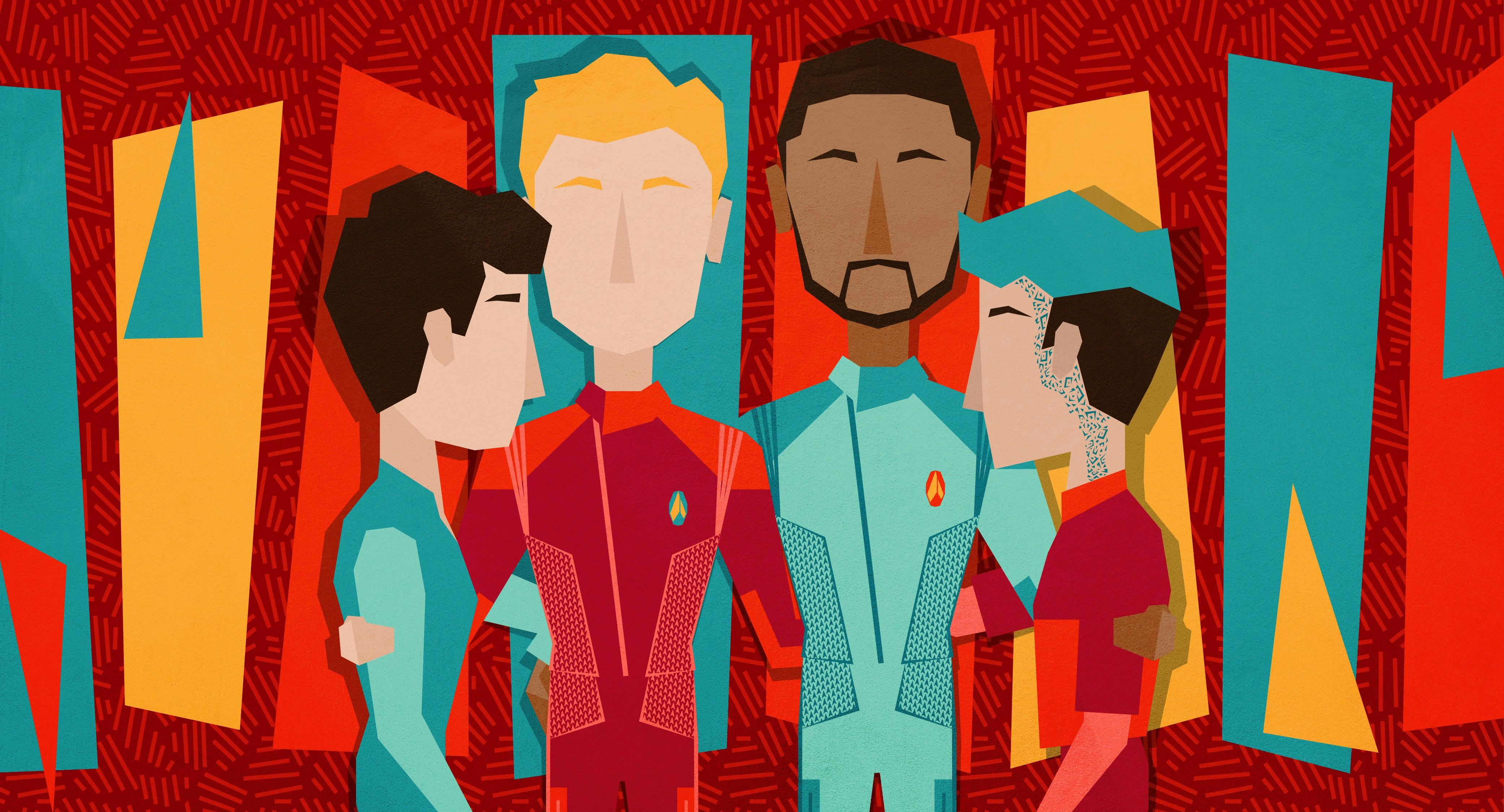
StarTrek.com
In a very real sense, we are all aliens on a strange planet. We spend most of our lives trying to reach out and communicate. If during our lifetime we could reach out and really communicate with just two people, we are indeed very fortunate.
Gene Roddenberry
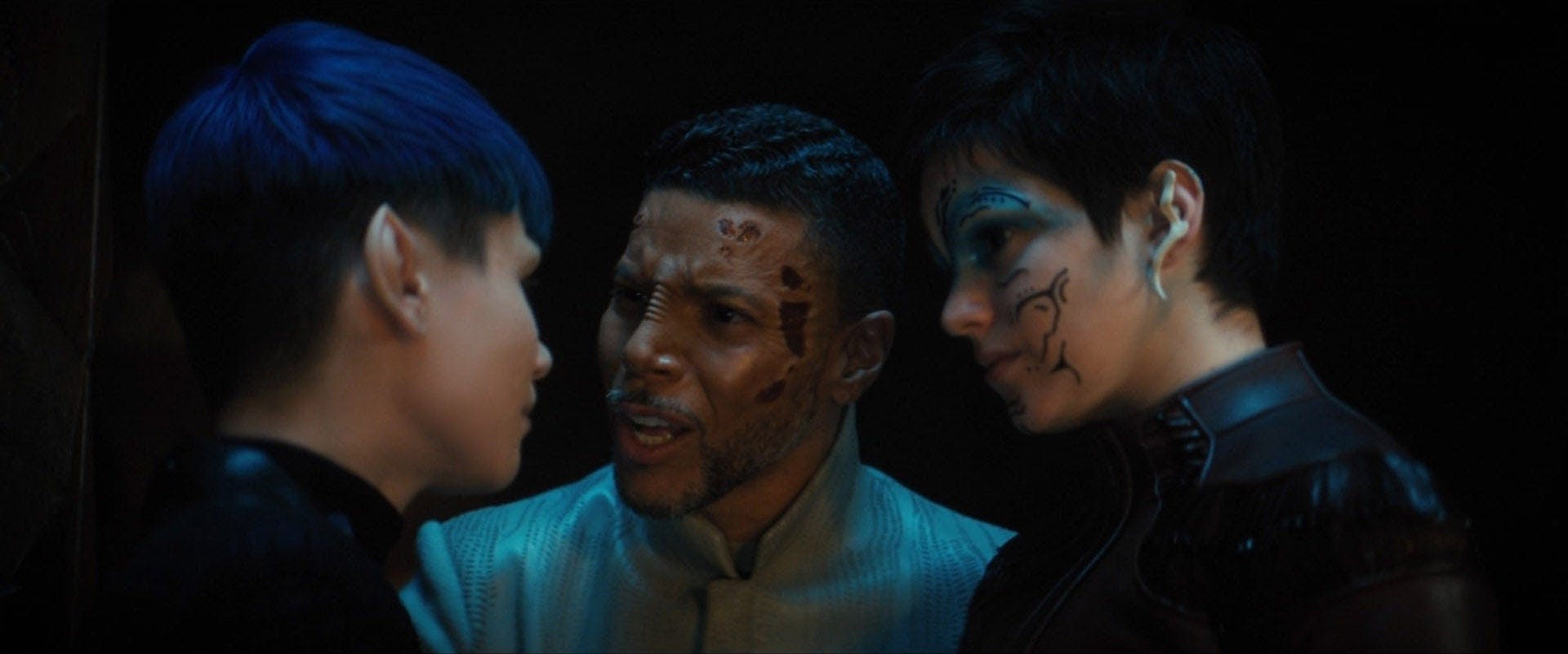
StarTrek.com
The best Valentine’s Day of my life was the one I spent in a bar full of Irish drag queens.
I studied for a semester in Galway in 2002, taking classes in literature and Irish drama and directing a staged reading of Moises Kaufman’s play The Laramie Project, about the murder of gay college student Matthew Shepard in Wyoming that had taken place just a few years before. Some of my theatre friends were meeting up for drinks at one of Galway’s gay bars, and when I arrived I discovered it was apparently drag night. Irish queens, however, I quickly learned - or at least, those who frequented this particular bar - did not adopt the glitzy high femme aesthetic I had come to expect from the movies. These queens dressed like perfectly normal middle-class people, like they were cosplaying the exact life they imagined they’d be living as cis women. It was like hanging out with a table full of gossiping Irish aunties - floral dresses, pearls, floppy hats, whiskey, raucous laughter.
I adored them.
I’d been out for barely a year by the time I landed in Ireland, so the experience of being in a room full of only queer people was still a thing of wonder. They told me stories about growing up gay in rural Ireland, how many of them moved to Galway for school and never went back because it was the first place they found anyone who was like them. I remember that they knew the words to “The Time Warp” from The Rocky Horror Picture Show, but no one had ever taught them the dance, so I did. I remember watching gay Irish men in their 40s and 50s nod in grim recognition when I told them the story of Matthew Shepard. I remember what joyous, hopeful people they were, how much they loved living in a college town, because it healed something inside them to see the ways the world was changing for young queer people.
Most of all, what I remember is how it felt to find home at a table full of strangers, how much I longed for a squad of rowdy Irish drag queen aunties to hold my hand and help me find my way in the world.
So many of us have stories like this, of the strange and mysterious ways queer people find each other, reach out for each other, see each other, at the moments in life when we most need to be seen. I’m one of the lucky ones. I have a family of origin who love me, who doted on my girlfriend when they met her at Thanksgiving and support the rights of queer people in our society. But that doesn’t mean I don’t need my found family too.
As a gay nerd who went to Star Trek conventions in middle school and had a life-sized cardboard standup of Major Kira, my adolescent gay awakening, next to my bed — and as a 90’s kid from the Rent and My So-Called Life generation, who grew up with Anthony Rapp and Wilson Cruz — Star Trek: Discovery has always felt like a gift to me personally. I’ve loved seeing a relationship between two men become so central to the plot of the series, and Tig Notaro’s quippy one-liners are a perpetual delight. But with the addition of Adira and Gray, Discovery gave me something I never thought I’d see in Star Trek: an intergenerational queer found family that looks like our real lives.
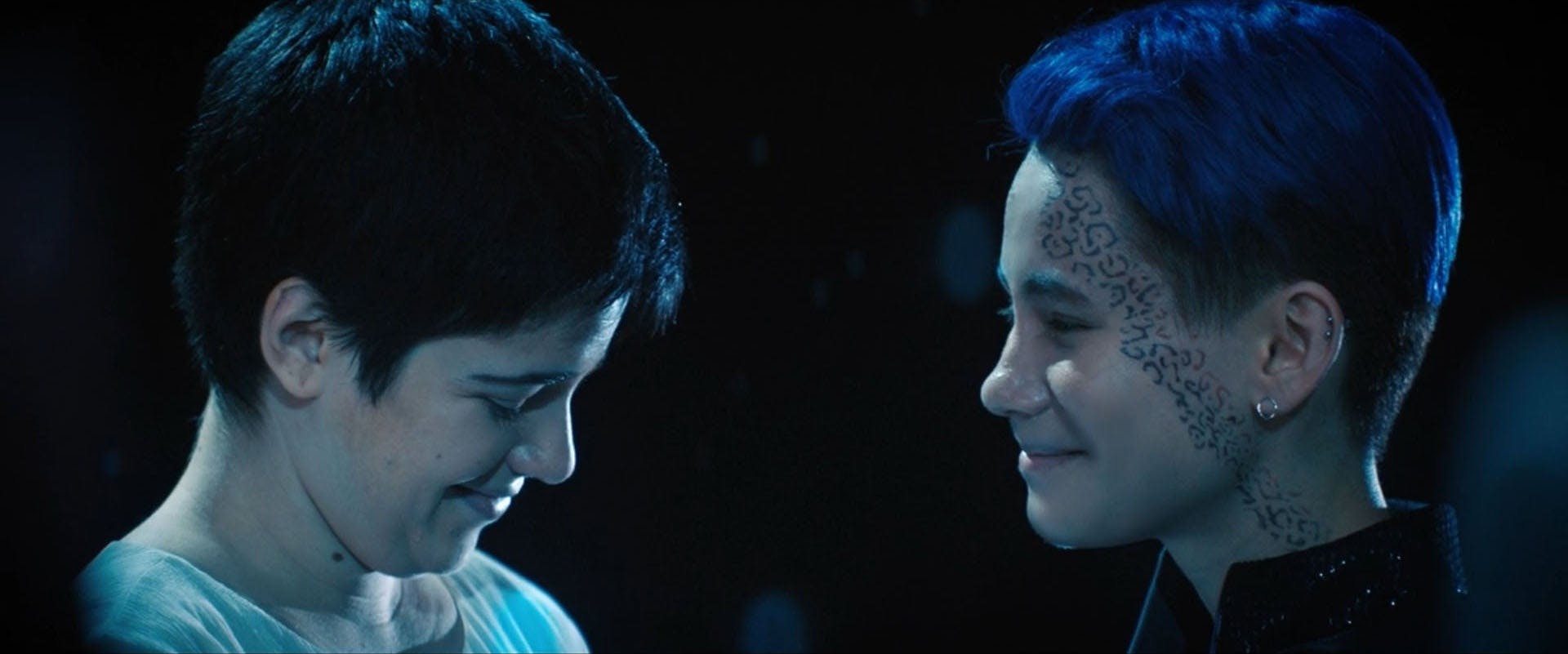
StarTrek.com
During the season three finale of Discovery, I burst into tears approximately forty-seven thousand times.
I cried when Ni’Var came to the rescue, I cried when Owosekun sacrificed herself to save everyone else and then the robot sacrificed itself to save her, I cried when Su’Kal finally faced his past and saw the message from his mother, I cried at Michael’s staticky voice coming in over Saru’s comm, I cried when we saw Lieutenant Sahil again, I cried at “Let’s fly,” and I cried when I realized that everybody got to live.
One overarching theme of this season was connection vs. isolation. A lonely Kelpien with no one but holograms for company inadvertently causes a dilithium reaction that nearly shatters the Federation into oblivion; without dilithium, long-distance travel becomes nearly impossible, with once-allied planetary systems now wholly cut off from each other. Restoring connection, mending broken alliances, pushing the Federation out of isolationism and back towards diplomacy, finding the source of the Burn to ensure they can prevent another one — this is the work our heroes set out to accomplish in season three, and the finale clearly sets up a season four where we’ll see that work continue. “The need to connect is at our core as sentient beings,” says the newly-appointed Captain Burnham in her finale monologue, just before the Roddenberry quote above appears on our screens, making the theme of the season textual.
This is, of course, classic Trek in all the best ways: a celebration of hope over despair, of bridge-building over grudge-holding (cat pun intended), of belief in possibility, of solving crises with empathy instead of brutality and cynicism.
What makes this particular framing of that theme unique is the way the broader story of connection across the universe is illuminated on the human scale by the way five queer people find connection with each other.
"Pride. It Suits You": Stamets and Adira
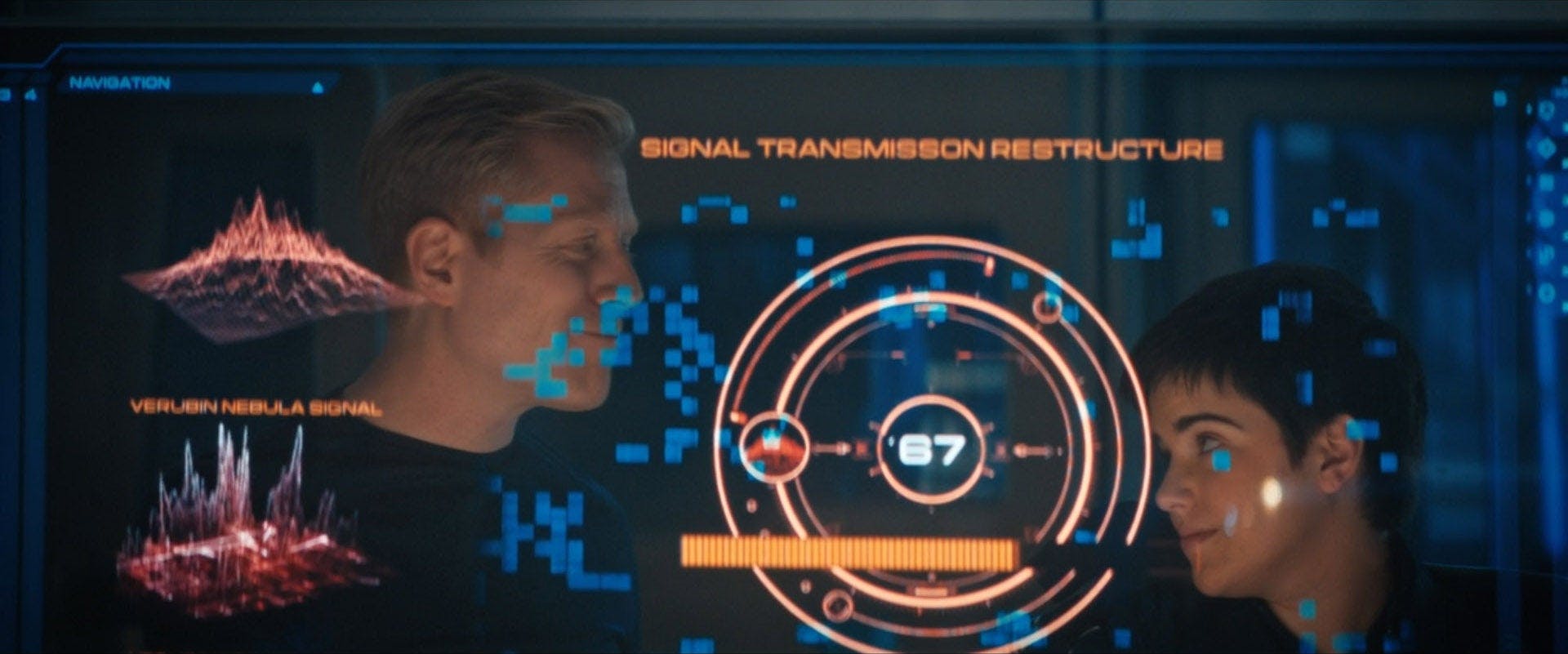
StarTrek.com
I spent my 20s as a Catholic youth minister, and my 30s in internet fandom. At first glance, this might sound like the two most opposite worlds imaginable; but one of the peculiar similarities was how often I was the safe adult for young queer people to come out to. Our unconscious mind figures these things out sometimes long before our conscious one; I remember how many of my favorite teachers as a young person were the gay ones, long before I understood why. And then once I was an adult, occasionally a young person would just click with me, for whatever reason, and then later they’d come out and it would all make sense.
Sometimes we seek out what we need before we even realize that we need it.
Adira Tal’s arc was one of the biggest joys of season three of Discovery. I particularly loved episode 308, “The Sanctuary”: AKA the one where Anthony Rapp plays the piano, the audience gets a master class in how to respond correctly when someone tells you their pronouns, and Stamets and Culber become the soft gay dads we all knew they were. It’s full of beautiful scenes which show how Adira — despite the overwhelming anxiety of adjusting to life as a Trill host — is beginning to find their voice and grow into their role on the crew, thanks to Stamets’ unwavering belief in their capacity and brilliance.
The pronouns scene is deeply meaningful to queer audiences, a reminder of why it matters to make things textual onscreen. When Adira finally speaks up, after the preceding scene makes it clear that the word “she” was grating on their ear like nails on a chalkboard, Stamets responds with a radiant, beaming smile of pride. And then, most crucially, it never comes up again, because Everyone On The Ship Learns About Pronouns is not the story; it’s about Adira’s deepening sense of self, and being supported by someone who truly sees them. (It’s so important to lift up trans and genderqueer voices in unpacking the emotional weight of this story; my personal fave is this beautiful essay by science fiction writer Charlie Jane Anders.)
Part of why it matters that these characters are played by queer actors is that there are nuances you have to have lived through to really understand: like knowing how it feels when a younger and more vulnerable queer person comes out to you, or asks you to use different pronouns, or shares some piece of themselves that they’ve never told anyone else. Because we all remember our own moments like that; we remember the queer mentors that were there for us, or how it felt to long for such connection if we didn’t have it.
I felt echoes of my own coming-out in that scene (the first person I told was a friend a few years older than me), and I remembered how it felt to be Adira, to Say The Thing Out Loud for the first time, that exhilarating rush of panic and relief combined. I also remembered all the times in my life I’ve been lucky enough to be the Stamets, on the other side, where someone asking to be seen in their truest light has trusted me with something so vulnerable. It’s a responsibility, and a gift, and an act of faith.
This is how queer found families are made.
"We’ll Find a Way to Help You Be Seen": Culber and Gray
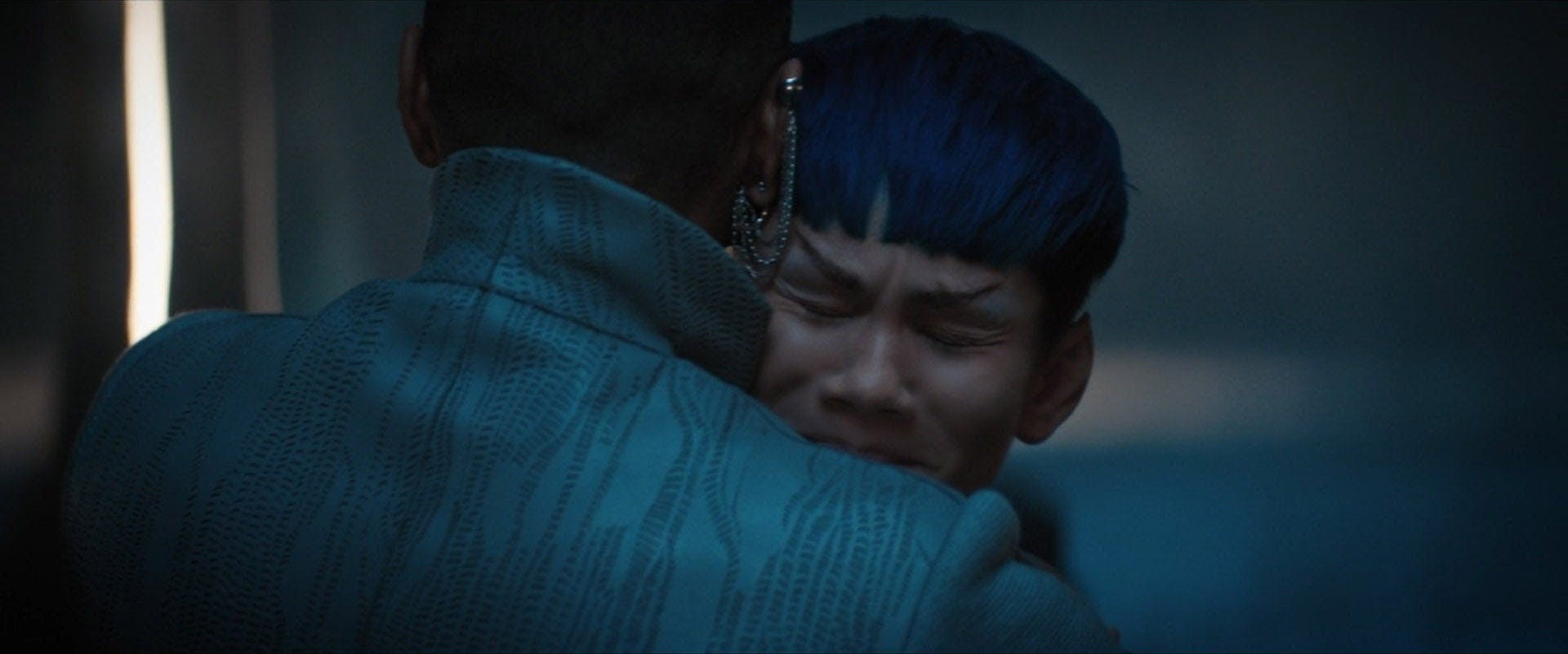
StarTrek.com
More than all my other finale cry moments, what really turned me into a weeping gay mess on my couch during that episode was the unexpected connection between Culber and Gray; not just because it was so lovely to watch, but because, like Gray, I had given up hope that he would ever get to have that again.
I was delighted to see him walk into the holo, with his adorable Vulcan eyebrows (quick sidebar in celebration of the “everyone is now a different alien race” plot device; Xahean Adira gave me all the feels about how well they would have gotten along with Po, Culber was fully rocking that Bajoran earring, and the bold choice to let us spend so much time with Doug Jones’ devastatingly expressive human face made this one of my favorite Saru episodes ever). But I gasped out loud when I realized everyone else could see him too.
Imagine the sheer, overwhelming relief of that moment, that reprieve from the crushing loneliness of a life lived only inside someone else’s mind. Gray gets to be human again, for a little while. He can touch the person he loves. He can be useful, doing the one task none of the corporeal beings around him can do, by stepping outside the parameters of the holographic world. He can be held and comforted by a trustworthy, loving adult whose presence makes him feel less alone.
Personal connection. A family again, after all this time.
We’ve known since the Trill were introduced that they live with the consciousnesses and memories of all their past hosts inside them. But until now, we’ve never really explored how those past hosts feel about it. And for Gray, at least, being real to only one person is an unbearably lonely existence.
So it makes perfect sense to see him begin to panic at the thought of Su’Kal shutting down the holo. “I’ll still see you,” Adira promises him, but that’s not enough. One person can’t be everything to any other one person. None of us can live like that. “Now I know what I’ve been missing,” Gray says. He can’t bear the thought of going back to being invisible.
But Culber, with a line I fully expect is setting up his arc for season four, is determined not to let that happen: “We got you, Gray. Okay? Adira, Paul and me. We’ll find a way to help you be seen - truly seen - by everyone.”
And when the family is finally reunited, even though we can only see three people hugging we haven’t forgotten the presence of the fourth. Culber and Stamets are Adira’s family now, and that means Gray is family too.
It’s the perfect capper to an intimate, emotional story that brings the season’s overarching plot down to the human level. It takes the whole queer family, working together, to finally solve the mystery of the Burn. On the ship, it’s Adira and Stamets who finally identify the Burn’s point of origin. Inside the nebula, it’s Culber and Adira who figure out exactly how Su’Kal caused it, and Gray who steps outside the bounds of the holo to see the things they can’t see. Using all the information they’ve given him, along with his own inherent gentleness and empathy, Saru helps Su’Kal sever his dangerous link to the dilithium planet, freeing it up to be mined, which means restoring warp travel and long-range communications to planets that have been cut off from each other for over a century.
In other words - it takes a queer found family finding connection with each other to help bring connection back to a fractured, broken universe.
"Helpless Is Not Forever": Jett Reno
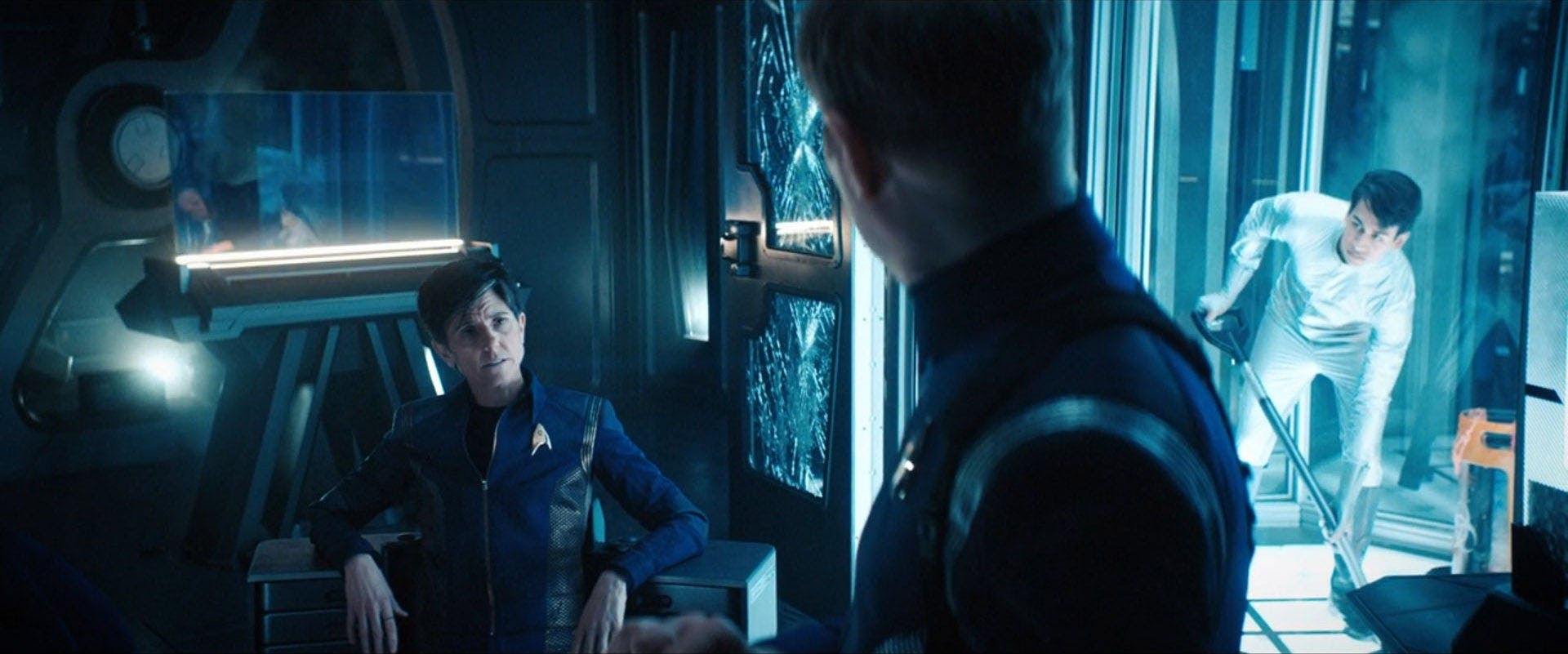
StarTrek.com
The season ends with Adira (and, implicitly, Gray) reunited with their gay space dads, but, significantly, it begins with the gay space dads needing a little support of their own.
When we rejoin the rest of the crew of Discovery in episode 302, “Far From Home,” Stamets has been brought out of his medically-induced coma early to make room in sickbay for all the casualties from the could-have-been-a-lot-worse-if-Detmer-wasn’t-such-a-badass crash landing. When he realizes the ship is in trouble, he decides to ignore Culber’s strict orders, opting to go fix the ruptured relay himself instead of staying in the regeneration chamber to let his body heal.
Reno is also injured, semi-immobilized and high on painkillers after the collision screws up her back. As the crew scrambles to rescue Discovery from the sentient ice chomping away at the hull, Reno too has to confront her own limits. The difference between her and Stamets is that she’s comfortable enough in her own skin to accept them. She has nothing to prove to herself, or to anyone else, and feels no shame in acknowledging that there are things she can’t do. As she offers Stamets “moral support” (translation: sassing him until he’s ready to shove her out an airlock), she also somehow knows exactly what he needs to hear, whether he’s ready to listen or not: “Helpless is a shitty feeling. But it is not forever, and it doesn't make you any less capable.”
Stamets, too, needs to be truly seen.
I’ve been thinking all season about how startling it is to watch such a specific slice of my own queer life reflected onscreen: the in-between period of your life when you’re old enough to have become a mentor to the younger queer generation, but you still need mentors yourself. I’m almost forty years old, and there are still times when I need an older person’s guidance and advice, the benefit of their life experience and wisdom and perspective.
Reno, in her own snarky way, is also part of this queer family. (Don’t forget, she’s the one who secretly loans Adira her comm to sneak onto Book's ship!) The connection flows through them in both directions. Adira needs Stamets, and Gray needs Culber, but Stamets and Culber need Reno too.
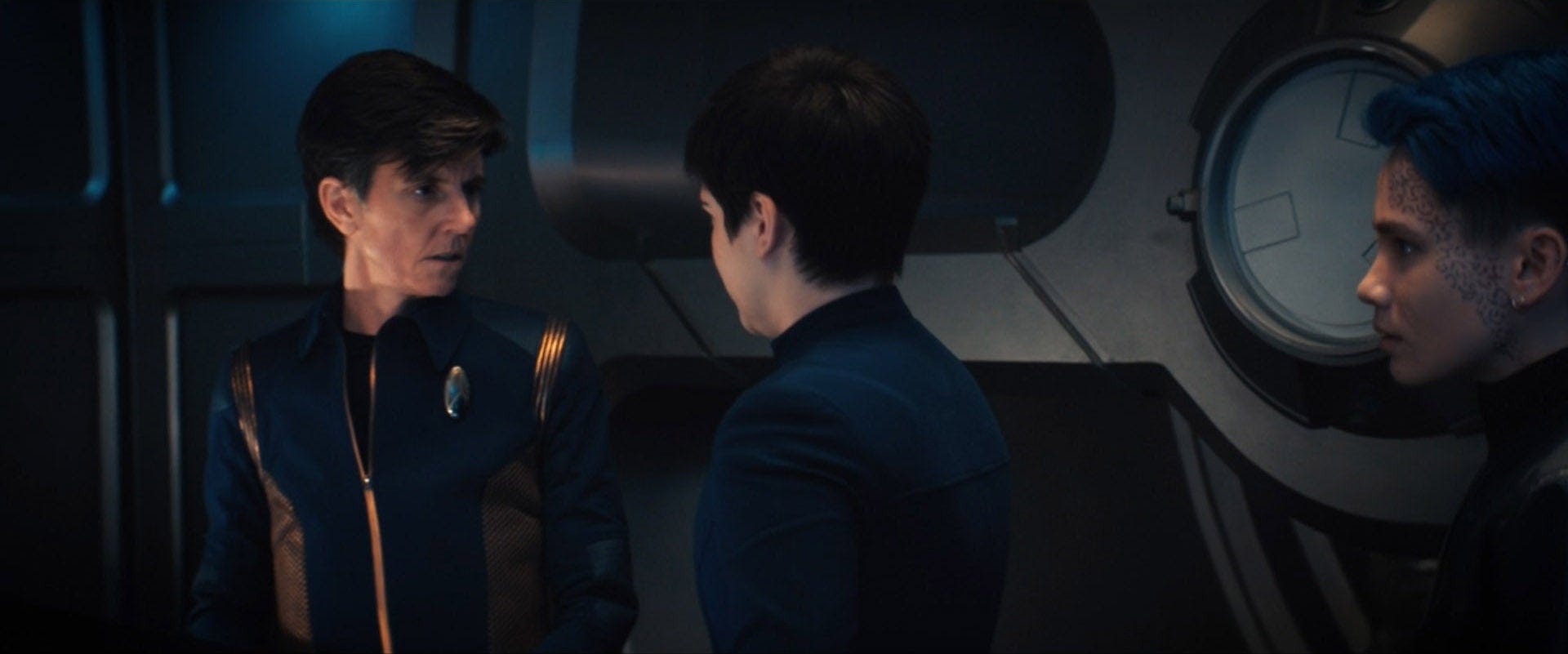
StarTrek.com
Queer people often feel, in Roddenberry’s words, like aliens on a strange planet.
Prime ministers and presidents don’t look like us. The people who get happy endings in romantic movies don’t look like us. Sometimes our own families don’t look like us. And no matter how many steps the world takes forward, there will always be people who want to drag us back into the past. To keep us cut off from everyone else, so we can never build communities, or find our voices, or step into our power.
At its heart, the third season of Discovery is a cautionary tale about disconnection. So many of the characters we meet this season are lost and adrift, calling out into the darkness to see if anyone can hear them. Michael Burnham, landing on an alien planet in an unknown future, searching desperately for any signs that her friends are alive. The Barzan scientist on the seed vault ship, with no company except the ghosts of his lost family. Su’Kal, trapped inside a collapsing illusion. Gray, invisible to everyone except Adira. Lieutenant Sahil, the very first character we see, all alone at a remote outpost, scanning desperately for Federation signals, hoping past all reasonable hope that there’s someone still out there.
Maybe that resonated with you. Maybe, whoever you are, you saw yourself in that.
If you grew up queer before the prevalence of internet communities; if you came from a family that repressed what you could watch or hear or read; if you spent years stranded in a world that seemed so unquestioningly cis and straight that there was no one around who could really see you . . . there are few things lonelier than that.
Maybe you thought you were all alone, on that strange planet. Maybe you thought the darkness was all there was.
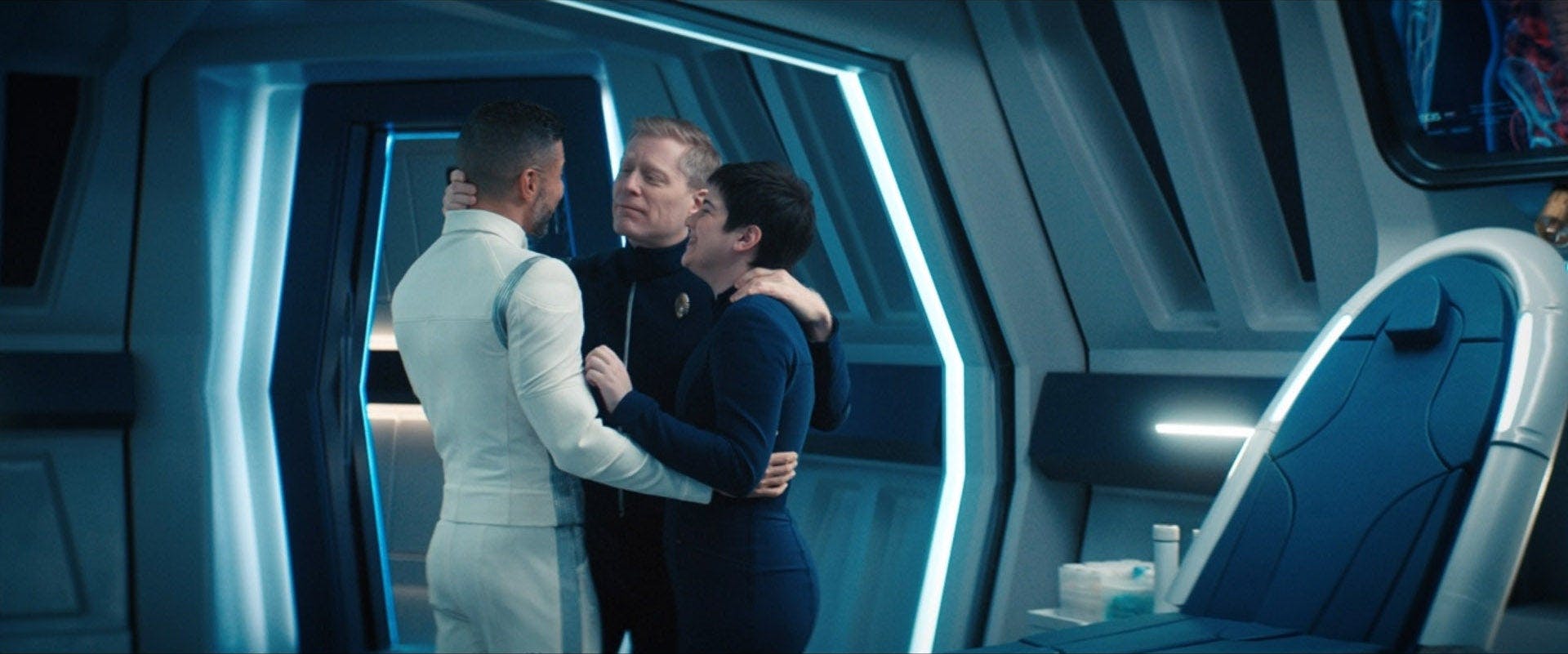
StarTrek.com
This is why representation matters. This is why queer found families matter, on and off the screen. Because so often, they’re the people who come to the rescue when we need them most, flying in with hope and love and connection and community when we’re lost in that darkness. The ones who hold us when we need to be held, or give us unflinching tough love when we need it; the ones to whom we can finally say out loud, “this is who I am.”
Even when no one else can see us, we can see each other.
Claire Willett (she/her) is a playwright, nonprofit grantwriter, and author of the time travel adventure series The Rewind Files. She lives in Portland, Oregon. You can find her on Twitter at @clairewillett, shouting about feminism, politics and television, or at @ClaireTrek where she live-tweets her Trek binge-watches.

